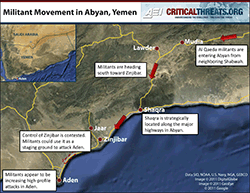 |
Control over south Yemen remains contested. The Yemeni military, with the cooperation of local tribes, has been unable to regain territory seized by al Qaeda-linked militants.
Al Qaeda-linked militants attacked Yemeni army troops in Dofes, to the west of Zinjibar. Twenty-six militants and ten soldiers, including a colonel, were killed in the fighting, according to Yemeni military sources. Yemeni military planes bombed a militant stronghold in Zinjibar and in Shaqra. Yemen’s ruling party website cited a military source who claimed that the Yemeni army had made significant progress against the militants and had destroyed a number of car bombs.
Al Qaeda in the Arabian Peninsula’s spiritual leader called on Saudi leaders to accept reforms. Sheikh Ibrahim al Rubaish, a former Guantanamo detainee, states that the government should: 1) Expel polytheists from the Arabian Peninsula; 2) Repeal secular laws, made by man, that have replaced shari’a; 3) Return the shari’a courts to their former standing; 4) Extend the authority of the Commission of Promoting Virtue and Forbidding Vice; 5) Permit Islamic scholars to speak freely, without fear of reprimand from the government; 6) Release all religious prisoners from jail; and 7) Facilitate the travel of those wishing to fight in Palestine, Iraq, and other Muslim lands. Rubaish warns that these steps are necessary in order for the survival of the Saudi government and warns that the government will be targeted if it does not make the suggested reforms. (Statement obtained and translated by SITE.)
Yemeni President Ali Abdullah Saleh issued a statement committing to presidential elections. Saleh said, “We have committed to the previous initiatives including the Gulf initiative and the efforts and statement of the (United Nations) Security Council and to moving toward achieving ... as soon as possible arrangements to hold general and free and direct elections for the new president of the republic.”
Protestors in Yemen have announced that anti-government demonstrations will continue through Eid al Fitr, the holiday that marks the end of the Muslim holy month of Ramadan. Protests are occurring throughout the country.
A resolution to the political crisis in the capital will not end the fragmentation of the Yemeni state, which remains at risk of a broader armed conflict. The current situation has increased al Qaeda's operating space in Yemen.
